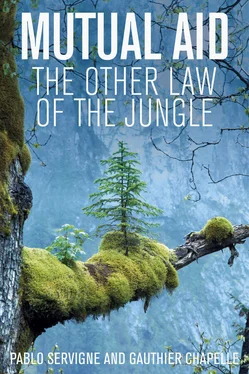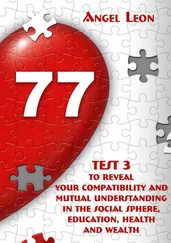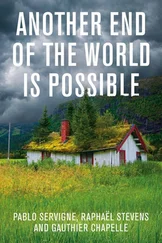As for frankly asymmetric relations, these are the best known: they are called predation and parasitism (relations +/−). In the case of predation, the predator is larger than or similar in size to its prey (an owl and its mouse-dinner in the first case, a wolf and an elk in the second), which it will usually kill before ingesting it; parasites, however, are mostly much smaller in size than their hosts, and they do not necessarily kill them. 45
You will have noticed that there is one category left: mutually negative relationships (−/− relationships). In fact, these are just a matter of competition . Behaviours expressing struggle, mutual aggression, combat, threat or tension are generally observed in connection with questions of territory (setting limits) or reproduction. But these are expensive relationships for both species, because each of them risks losing a few feathers or tufts of hair, or even their lives. To avoid this risk and minimize energy loss or spilled blood, many species have developed ways of avoiding combat by simulating it with large gestures or threats. These are the so-called ‘ritualized’ behaviours: they are used to signal their intention, their determination or strength to others, but without coming to blows with claws/beaks/feet/teeth/poison. Think about the fights between deer, roosters, beetles or felines. Competition is by definition a source of stress; so in general it is only occasional (in animals), because it is exhausting and dangerous.
But why, if competition is so bad, does it lie at the heart of our Western culture? Why is it so hard for us to accept the pervasiveness of beneficial relationships in nature? To understand this, let’s look at the story of two naturalists who left their mark on their age.
Why society didn't see it – a story of myths
In 1859, the year of publication of Charles Darwin’s key work, On the Origin of Species through Natural Selection , the young Russian prince Peter Kropotkin was only seventeen years old. Over the following years, the work of the great English naturalist would have a decisive influence on the scientific training of this young nobleman. Passionate about the natural sciences, Kropotkin undertook several expeditions across the Eurasian continent, as far as eastern Siberia, to observe examples of the natural selection described by Darwin. But, curiously, what Kropotkin observed was mainly mutual aid: animal species, such as wolves, and small human societies without a state, combining to survive in difficult, even hostile climates. He drew from this a certainty that would become a principle: organizations that help each other are those that survive best.
Kropotkin, the anarchist prince swimming against the tide
Born in Moscow into an aristocratic family, 46Kropotkin was destined for an elite life in the Russian Empire. However, he was educated by a French nanny who transmitted the values of the Enlightenment, and, at nineteen, he chose science over the comforts of a career at the imperial court. He requested to be assigned to a Cossack unit in Siberia, where he expected to find wide scope for his studies. His scientific and humanistic sensibility drew him away from the brutality of the army, which he left in 1867, and led him to pursue studies in geography and mathematics.
His passion for humankind would find expression in a growing political commitment, which was strengthened by his contact with the Jura Federation 47and anarchists such as the great French geographer Élisée Reclus and the Italian revolutionary Errico Malatesta. This was a time of revolution: Europe quivered, trembled, crackled to the rhythm of insurrections, barricades, workers’ movements and the expansion of socialism. The Russian geographer rubbed shoulders with the anti-authoritarian branch of the First International, which led him to spend several spells in prison in Russia and France. It was in London that he spent the end of his life writing many works, the best known of which were Ethics (1889), The Conquest of Bread (1892) and Mutual Aid: A Factor in Evolution (1902), which would provide anarchism with its scientific and theoretical foundations.
Many of the observations that Kropotkin made in Siberia as a geographer, anthropologist and zoologist are described in Mutual Aid . 48He added a summary of the scientific work of the time on animal societies and ‘primitive’, ‘barbarian’ and ‘mediaeval’ human societies. He also observed the organization of indigenous peoples (devoid of any centralized power), whose rules, he noted, were based mainly on relations of cooperative exchange. 49
Kropotkin opposes head-on the idea that Nature is a permanent war of all against all, an idea developed by the philosophers Locke and Hobbes, 50as well as by the influential intellectuals who transformed the theory of natural selection into an ideology of competition. 51In Mutual Aid , Kropotkin’s two passions, science and humanist political commitment, combine in a quest for the foundations of an anarchist ethic. For him, the main natural law is not competition, nor the ‘survival of the fittest’, but mutual aid. 52
He even takes the argument further: the deployment of mutual aid, insofar as it is seen as a product of evolution, does not require the intervention of a central authority. So, in the last parts of his book, he describes the brutality with which the model of the state imposed itself after the Middle Ages, destroying all the profound bonds of mutual aid that existed in those small communities. To create a new society, one that would be peaceful and more fairly organized, he therefore advocates not fighting against nature, but drawing on our natural inclinations towards mutual aid. And he (quite logically) deduces that we must abolish the state and any other form of large centralized government.
As evolutionist Stephen Jay Gould (1941–2002) puts it, ‘We must shed the old stereotype of anarchists as bearded bomb throwers furtively stalking about city streets at night. Kropotkin was a genial man, almost saintly according to some, who promoted a vision of small communities setting their own standards by consensus for the benefit of all, thereby eliminating the need for most functions of a central government.’ 53
Kropotkin’s originality, then, lies in the fact that he brought naturalistic arguments to the political debate. Starting off in search of the biological foundations of mutual aid, he adopted the opposite tack from most left-wing thinkers of his time (including the supporters of Marx), who instead adopted an anti-determinist conception of human nature: they thought that human beings were not subject to the laws of nature, and that their minds, at birth, were a ‘tabula rasa’, 54a completely malleable blank page. For these anti-naturalists, human identity therefore depended on social structures, not on nature. So, in their view, if it were possible to change all social relations (on what was sometimes called ‘ Le Grand Soir ’, the ‘great evening’ of social revolution), then it would be possible to change human nature and create a new kind of human being.
There are two reasons for the blacklisting of Kropotkin’s work by the orthodox currents of the left. First, he holds a radically different view of the ideal society: he challenges large social organizations that are meant to inhibit the nature within us, and thus he opposes the idea that there is a radical break between us and the rest of the living world. Second, his revolutionary commitment was to the anarchists, who advocated decentralized federalism and self-management rather than hierarchical state structures (socialism or authoritarian communism). He was opposed by the ‘authoritarian’ left, by capitalist political and economic elites, and by his own aristocratic family, and was imprisoned in 1874 in Saint Petersburg for ‘revolutionary activities’. He managed to escape two years later, but in 1883 he was again captured in France, and imprisoned in Clairvaux prison for having supported the workers’ strikes in Lyon. It would take three years for him to be pardoned, following pressure from many intellectuals, scientists and geographers from the whole of Europe (including Victor Hugo). Then the twentieth century forgot him.
Читать дальше












